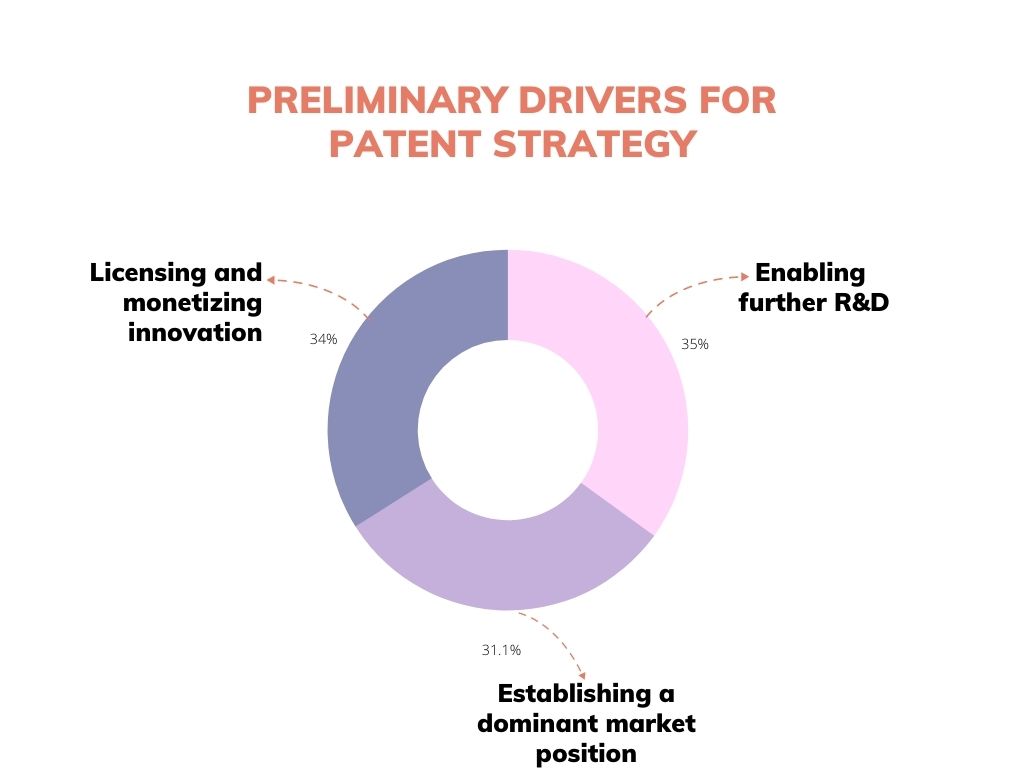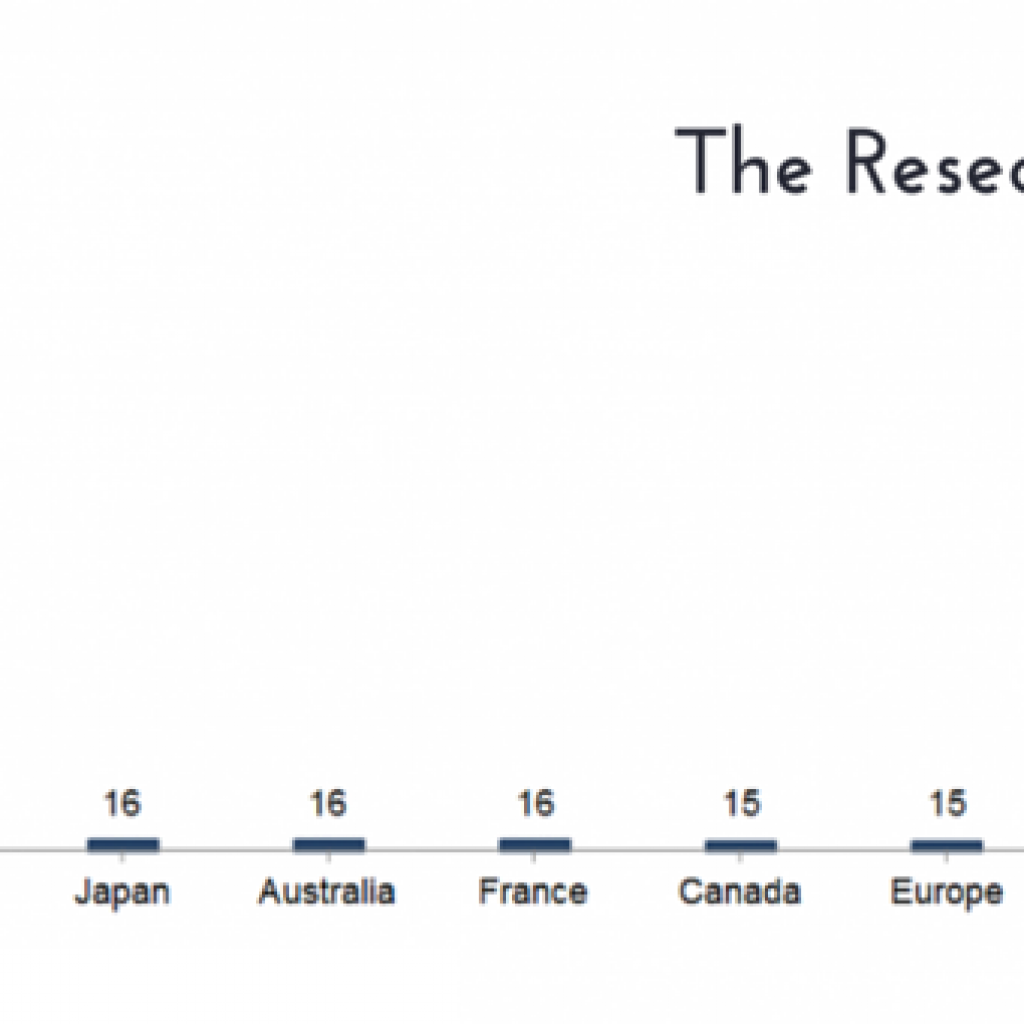While going through weekly emails from the marketing team, I stumbled upon the above statement. This in return made me search more into the Clarivate Patent Trend Report of this year. I have seen similar reports but did not know what to expect from this one, and how I could make it worthwhile for our readers and even for GreyB employees. So, I analyzed the Clarivate Patent Trend Report 2022 to filter out some key pointers worth knowing. But why this report out of many?
Why did I choose to study Clarivate Patent Trend Report?
Clarivate’s data is derived after analyzing the views of 275 IP and patent professionals, both in-house and external counsel, across seven countries/regions: the United States, United Kingdom, France, Germany, Mainland China, Japan, and South Korea.
The report lays down research into patent trends across key global regions to gain a deeper insight into how organizations use patents and data, challenges and opportunities, and the role patents play in driving the innovation lifecycle.
We thought to analyze the report and share our views on the data.
How have the last 12 months affected patent trends?
- To understand the survey audience, in the last 12 months, around 69% of these organizations have filed up to 100 patents. Out of all these, ~33% have filed 1 – 25 patents, and ~23% have filed between 51 – 100. This implies this is a good mix of audience. A look at the IP Facts and Figures revealed that the industries filing the most patents during the last 12 months were computer technology, medical technology, and digital communication. It can be derived that the industries least affected by the pandemic continued to strengthen their patent portfolios.
- As per the report, 73% of organizations in South Korea, 66% of organizations in France, and 63% in Japan have said to be spending less than $5m on maintaining and obtaining patents. The figures did not consider the size of the portfolio they are managing, and we are not sure of the same.
Innovation in the above countries seems to be happening at a rate much less than that in countries like China and the USA where innovation labs are being set up.” Chakshu Kalra, director at GreyB, shared his perspective on the above stats.
What do you think about these stats, and what could you derive from them? Do share your views in the comment section.
- When discussing the impact of the last 12 months on portfolio sizes, most (69%) of patent portfolios have increased. Of these, 15% have significantly increased.
An obvious question that follows is what to expect from this rise in portfolio sizes.
Shikhar Sahni, Sr. Vice President of GreyB, answers this question best.
“With the increase in portfolio size, we can expect the following in coming years-
- New and improved products in the coming time will indicate the type of technology focused on the patents.
- More focus on the use of patents in the coming time as a money-making tool; i.e., we can also expect more litigations in certain industries.
- It can also mean IP budgets may increase in certain industries if they soon get ROI from this investment portfolio.”
- Answering the question, will it become harder to implement the patent strategy in the last 12 months? Over 57% of respondents said it had, while 38% said it had not, and 5% weren’t sure.
What follows is why it became so difficult and what had been causing hurdles in implementing the patent strategy. The Clarivate report set forth various causes for the difficulty in executing a patent strategy, such as:
- Insufficient staff contributing 38%
- 34% contribution was caused by insufficient data
- Insufficient budget to support (33%) / Insufficient time (33%)
It isn’t hard to understand that implementation becomes difficult without proper team play in planning a patent strategy. In return, it is essential to give proper education regarding patents and their need to the company staff. Conducting seminars on the same and studying the growth of competitors who invest in their patent portfolio can reduce the difficulty in implementation. In addition, with an educated staff, more budget can be allocated to executing patent strategy, and companies can overcome the above-listed hurdles.
Patent Strategy and Data Usage perception by organizations
With the study of Patent Trend Report 2022, it became clear that patents are seen more as an innovation enablers rather than a protector. Around 75% said that the prior purpose of their patent strategy is to enable further innovation.
“In the case of health care, the idea behind patenting is both, to protect the innovation and invent around it. Whenever a company innovates a new drug, they go for filing a patent so they can be the sole proprietor in selling that drug for 20 years. Plus, they innovate around it the drug delivery mechanism, using different excipients, and file more patents.”, explains Arindam Som, Operations Group Manager at GreyB, while talking about his views on this insight from the report.
“In the case of telecom, some companies have a strategy to obtain patents that can be declared as a standard-essential patent so that they can claim a good amount of royalty by submitting those SEP patents to the pool like Via or Avanci. Or in cross-licensing with a competitor, they get the upper hand. So, earning money is the major goal here.”, he adds.
The top three preliminary drivers for patent strategy are represented in the diagram below-

The study in the report also shows that over 67% of in-house respondents think that the C-suite is involved in patent strategy in some shape or form, while one-third say that they are not usually involved.
I wondered if the data depicts the need to involve upper management in the patent strategy and shared my query with Nikhil Gupta, Prior-Art Manager at GreyB, and here is what he shared.
“C-suites are the people who set the tone in the company. If they are involved in patent strategy this makes it a core part of every discussion that is happening in the company and the overall strategy of the company. Like some users mentioned above that insufficient staff contributing being the one of the hassles, having CEO on your side can easily solve this issue.”
Hence, it is essential to make the C-suites understand the importance of a strong patent strategy and involve them in the same.
Further, the report highlights that there is a disconnect between confidence in the usage of patent data and the reality of how it is being used. An explanation for this may be that respondents lack the skillsets or capabilities to translate the data findings they’re leveraging for the C-suite.
Conclusion
The Clarivate patent trend report 2022 has revealed that even though the last 12 months have been turbulent for businesses, patent protection and its role in the innovation lifecycle remain critical. The report gives direction to various aspects of the patent industry, as discussed above. A deeper analysis of this report and the patent trend is essential to form the backbone of your company’s IP strategy.
Wish to plan the next course of action for your patent portfolio management? with our team, and we’ll help you strengthen your hold in your domain.











